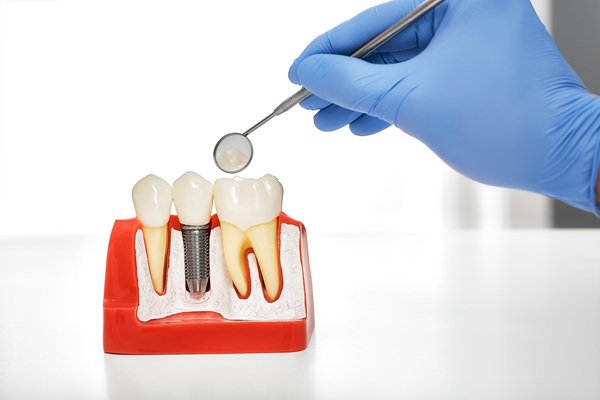Making Your Implant Crowns Last

Implant crowns are typically recommended when an implant is being used to replace a lost tooth. This artificial teeth root is surgically inserted into the patient’s jaw. The implant fuses with bone tissues around it through a process known as osseointegration. As a result, bite forces are transferred through the implant crown and implant to the person’s jaw, stimulating tissues and preventing the bone tissue breakdown that can happen when a tooth is lost.
Getting the most out of implant crowns
Implant crowns are ideal long-term options for replacing teeth. These restorations look like natural teeth, and they do not require anything besides brushing and flossing to keep them in great condition. The implant that the crown sits on is typically made out of titanium, and it is designed to last a lifetime. Implants crowns can last up to 30 years when properly cared for. Simple things that can be done to make an implant crown last longer include:
- Good oral hygiene: Crowns are not vulnerable to the acids made by oral bacteria, but the gum tissues that support them are; good oral hygiene helps remove plaque deposits and prevent stains from forming on the crown
- Avoid hard foods: An implant crown is designed to handle tremendous bite forces, but it is not as durable as real teeth, so hard foods like ice or hard candies can lead to a crown becoming damaged; people with crowns should also avoid using their teeth for things that they are not designed for, like opening packages
- Use appropriate mouth protection: People with crowns should take extra steps to protect their teeth from forces that they are not designed to withstand, including wearing a mouthguard when engaged in contact sports or a nightguard to reduce the effects of teeth grinding
What to expect when getting an implant
Dentists often recommend implants for missing teeth replacement due to their bone-preserving properties. Other missing tooth replacement options, like dentures and bridges, do not address bone deterioration. Patients must be assessed to determine if they are healthy enough for implant surgery.
Replacing a missing tooth with an implant can take over six months. The first step is inserting the implant into the patient’s jaw. A local anesthetic is administered, and the dentist might have to make an incision to reach the patient’s jaw.
A hole is drilled into the jaw, and then the implant is placed in it. Bone tissues around the implant hold it in place via friction, the same way that wood holds a nail in place. In some cases, an implant crown might be attached during the same visit, or the dentist might wait for the implant to fuse with the patient’s jaw.
Implant crowns provide a long-term solution for missing teeth
Are you missing one or more teeth? Implant crowns may be the solution you are looking for. Call or stop by our Needham office to set up a consultation with our dentist.
Request an appointment here: https://needhamdentistry.com or call Needham Dentistry & Implants at (781) 429-3080 for an appointment in our Needham office.
Check out what others are saying about our services on Yelp: Implant Crown in Needham, MA.
Related Posts
Teeth whitening is a popular cosmetic dental treatment. This procedure can effectively brighten your smile by addressing discoloration and stains. By understanding how teeth whitening targets stains, you can see how the process can restore your teeth to a cleaner and more youthful appearance.Tooth discoloration can occur for several reasons, and identifying the source is…
All-on-4® implants are an ever-growing trend due to their permanence and ease. Many people struggle with temporary tooth solutions such as dentures, as they can slide around and need frequent resizing. All-on-4 implants are completed by inserting posts into the jawbone and replacing all teeth. Before attempting to get surgery for the implants, there are…
Visiting a family dentist biannually (every six months) can help maintain optimal oral health. A family dentist provides consistent, comprehensive professional care that can prevent serious dental issues before they develop. This routine schedule offers a practical approach to long-term oral hygiene and wellness.Seeing a family dentist every six months is important because these visits…
Most people associate teeth straightening treatment with enhancing their smiles; however, treatment can also be used to improve oral health. When the teeth are crooked, gapped, or crowded, the result can be difficulty performing oral hygiene. Poor oral hygiene can lead to a build-up of plaque, which ultimately can destroy both the teeth and gums.…
